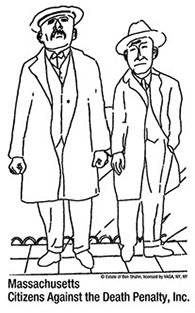Founded in 1928, MCADP is the oldest active anti-death penalty organization in the United States.
Massachusetts Citizens Against the Death Penalty

Detail of Bartolomeo Vanzetti and Nicola Sacco from the cartoon of a mural by Ben Shahn © Estate of Ben Shahn/Licensed by VAGA, New York, NY
Speakers AvailableIf your group or organization is planning to have a forum or discussion on the death penalty MCADP would be pleased to supply a speaker.Please email MCADP and we will call you to discuss details.A federal jury on January 9, 2017 re-sentenced Gary Sampson for the murder of Jonathan Rizzo.
In 2001, Sampson murdered 19-year-old Rizzo and 69-year-old Philip McCloskey in Massachusetts and then killed 58-year-old Robert Whitney in New Hampshire before he was finally captured. He was charged in federal court with carjacking and murdering Rizzo and McCloskey. A federal jury in 2003 sentenced him to death for both murders, but that sentence was overturned due to juror misconduct.
Sampson’s crimes were heinous and inexcusable. Our thoughts are with his three unfortunate victims and their friends and families.
Massachusetts Citizens Against the Death Penalty opposes the death penalty in general because it gives too much power over life and death to a human government that is necessarily imperfect and, in practice, the death penalty has been imposed arbitrarily, too often at the expense of minority groups. The Sampson case is but one example of the imperfection that plague capital cases.
The very prosecution of this case seems inconsistent with the reason Congress made a killing connected with a carjacking a potential capital crime. Congress wished to punish car thieves who stole cars by kidnapping and killing car owners to get their cars. Sampson’s motive was not car theft. Rather, he sought to kill people in order to get the attention of the authorities so he could be arrested and jailed, after his efforts to call the FBI and get himself arrested for the bank robberies he was wanted for failed. He found his two Massachusetts victims through hitchhiking, and incidental to the murders he committed, he took their cars. As awful as this is, this is not the reason Congress made carjacking a murder a capital offense, and thus the capital prosecution was itself a stretch.
It is doubtful that a federal prosecution would have happened at all if not for the fortuity that Michael Sullivan, the Massachusetts prosecutor who was responsible for handling the state charges originally brought against Sampson, had not then been appointed the U.S. Attorney. Had that not happened, the two Massachusetts killings would have been handled in state court and Sampson, who did not contest his guilt, would have been sentenced to life imprisonment long ago, just as he was sentenced in New Hampshire state court for the killing of Mr. Whitney.
Given the nature of the crimes and the presentation to a jury composed of individuals who swore that thy would be willing to impose the death penalty if the prosecution proved its case, it is not altogether surprising that this second jury handed down a death sentence. But what is surprising is that this jury, unlike the first jury, imposed the death penalty only for the killing of Mr. Rizzo, and not for the killing of Mr. McCloskey. The murders themselves were virtually identical. Sampson kidnapped both men when they offered him a ride, brought them to a wooded area, and stabbed them repeatedly. The Boston Globe speculated that the different result can be explained by Sampson’s confession, in which he described the killing of Mr. Whitney as the result of an emotional outburst, while the killing of Mr. Rizzo was planned. For now, we cannot know for sure the jury’s reasoning, but what we know is that the first jury heard the same confession and reached a different conclusion. Such inconsistent results based on the same evidence hardly demonstrate any reason for confidence that death penalty trials will reach fair results.
Finally, it should be noted that the verdict is not the end of this case. U.S. Attorney Carmen Ortiz glossed over this in her post-verdict statement when she said that Mr. Sampson “will pay with his life for all the heinous crimes he committed.” That is highly unlikely. Since the federal government reinstituted the death penalty in 1988, it has executed only three people, the last in 2003. No one has been executed for a carjacking murder. Sampson is unlikely to be the first. As was revealed at the trial, he has end stage liver disease. Once this progresses to liver failure, he will have approximately six months to live, absent a liver transplant. The point of going through the motions of obtaining a death sentence for a man who already faces the end of life is lost on us.
Massachusetts Citizens Against the Death Penalty, Inc., 2017
For the latest information, please follow us on the MCADP Facebook page.
Massachusetts Citizens
Against the Death Penalty, Inc.
PO Box 51920, Boston, MA 02205
e-mail: mcadp1927@gmail.com